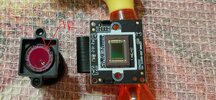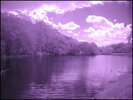Felling like running around like a lilliput near the legs of a couple of very knowledgeable godly giants trying to listen and understand the topic of their discussion. Ecstatic right now

With the little I understand about optics, it seems the further away a lens focus (in VIS light) is , the extended the focus points for various wavelength gets due to further fanning out. it is like cutting the rainbow at even shallower angles.
Only going for say 850 nm to 950 nm. I think 850 led is what I want. Checked the frequency response curve for IMX462. most responsive in that range. hope this will be somewhat similar.
@Dashmellow
I thought IR written on the lens meant it had anti reflective coatings that worked in IR range too. So it was usable in IR.
Or may be it means it has IR block to improve VIS light photography .. which is true ? I googled this now and failed to ascertain this.
Me wanting VCSEL 850 nm laser is cause , these waste less power as heat and gives off stronger light that will travel further afield. and VCSEL s have more symmetrica beam right off he device without lens etc to form and collimate the beam. Wont e focusing and certainly not pointing towards lens sensor though.
 @Nigel
@Nigel
I want to use it at night. So no issues with its performance at daytime. I like to trek and go to forlorn areas and jungles. It has always been my habit to be in the dark when alone outside and not light torch unless really need to. simply to enhance personal safety. feel safer in the dark. Cause usually people will think I am sleeping.
This will be my eyes in the dark. Might also Buy LWIR devices like topdon or Infiray. Working for this first cause I can illuminate here.
Thank you for all your kind responces , guys !!!


